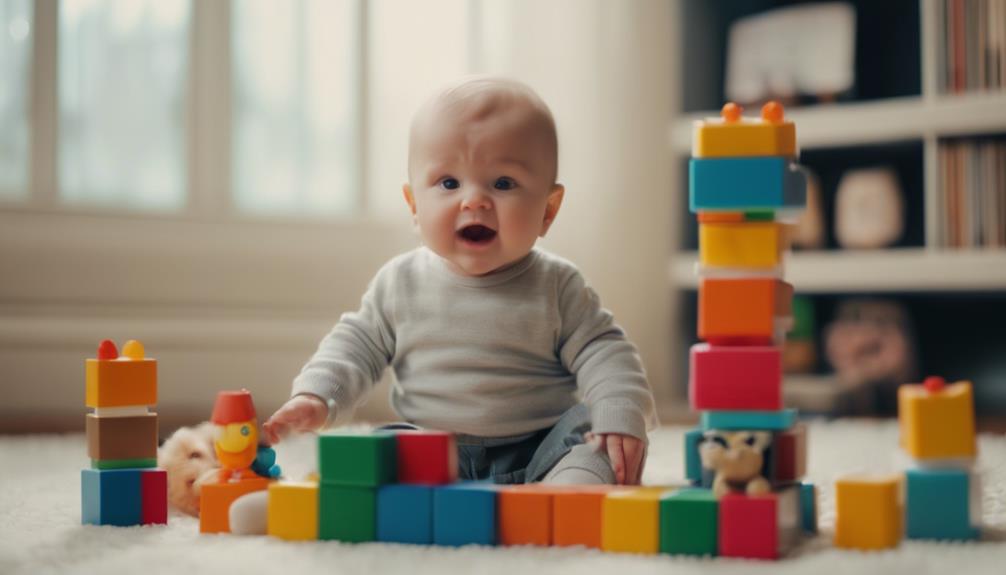To ensure that your baby is intelligent, focus on prenatal care, stress management, nutrition, communication, bonding, quality sleep, and avoiding harmful substances. Engage in prenatal exercise to enhance brain development. Use relaxation techniques to manage stress. Offer a healthy diet for cognitive growth. Encourage communication through interaction. Bond and play with your baby to promote brain power. Ensure good quality sleep for cognitive function. Avoid harmful substances for a smart baby. These proven methods promote intelligence and overall well-being in your child. By following these steps, you can establish a solid foundation for your baby’s cognitive development.
Key Takeaways
- Engage in regular prenatal exercise for improved brain development.
- Manage stress with relaxation techniques like meditation for cognitive benefits.
- Ensure proper nutrition with omega-3 fatty acids and choline for brain health.
- Communicate frequently through talking and reading to enhance language skills.
- Prioritize quality sleep and avoid harmful substances for optimal cognitive function.
Prenatal Exercise for Brain Development
Engaging in regular prenatal exercise can greatly enhance your baby's brain development by improving blood circulation and delivering essential nutrients to the developing brain.
Prenatal exercise plays an important role in supporting a healthier pregnancy and contributing to positive outcomes for cognitive development in infants. By engaging in at least 150 minutes of moderate exercise per week during pregnancy, you can boost cognitive development in your baby.
This physical activity promotes the release of endorphins, reduces stress levels, and enhances your mood, benefiting both you and your little one.
The improved blood circulation from prenatal exercise guarantees that crucial nutrients reach your baby's developing brain, aiding in excellent brain growth.
Stress Management Techniques for Pregnancy

Managing stress during pregnancy is essential for both your well-being and your baby's development.
Relaxation techniques, such as breathing exercises and mindfulness practices, can help you alleviate stress and promote a healthier pregnancy.
Relaxation Techniques for Pregnancy
During pregnancy, finding effective relaxation techniques is essential for managing stress and promoting a healthy environment for your developing baby. Incorporating stress management activities like meditation, exercise, and socializing into your daily routine can greatly impact your well-being and that of your baby.
Exercise, in particular, plays an important role in promoting cognitive development in babies by increasing blood circulation and delivering important oxygen to the developing brain.
To enhance relaxation during pregnancy, aim for at least 150 minutes of moderate exercise weekly. This can help release endorphins, reduce stress levels, and improve your overall mood.
Prioritizing stress relief activities not only helps you cope better but also allows your body to return to a restful state, benefiting both you and your baby.
Breathing Exercises for Stress
To enhance stress management during pregnancy, consider incorporating breathing exercises into your daily routine to promote a healthier environment for your baby's development.
Breathing exercises play an essential role in reducing stress levels and creating a more relaxed atmosphere for both you and your baby. By practicing deep breathing techniques regularly, you can increase oxygen flow to your baby, which aids in relaxation and overall well-being. These exercises have been shown to lower cortisol levels, mitigating the negative impact of stress on your baby's development.
Additionally, controlled breathing can enhance blood circulation, supporting your baby's brain development and overall health. By integrating breathing exercises into your daily regimen, you not only improve your emotional stability but also contribute to a positive pregnancy experience.
Prioritizing these simple yet effective techniques can have lasting benefits for both you and your baby during this precious time.
Mindfulness Practices During Pregnancy
Engaging in mindfulness practices can significantly reduce stress levels during pregnancy, benefiting both you and your baby's development. Pregnancy can be a time of heightened emotions and stress, making it important to prioritize stress management techniques like mindfulness.
By incorporating mindfulness practices such as meditation and deep breathing into your daily routine, you can create a calmer environment for both yourself and your baby. These stress-relief techniques not only help in maintaining a healthier pregnancy but also support excellent cognitive development for your little one.
Research has shown that high stress levels during pregnancy can have negative impacts on the baby's development, highlighting the importance of stress management during this critical time. Prioritizing stress relief through mindfulness practices can help your body return to a restful state, promoting better outcomes for both mother and baby.
Embracing mindfulness during pregnancy can lead to a more peaceful and beneficial experience for you and your baby's well-being.
Stimulating Communication With Your Baby

Interact frequently with your baby through talking and reading to enhance their communication skills and cognitive development. By engaging in verbal interactions, you can stimulate early language acquisition and help your baby recognize sounds and voices from a very young age.
Even before birth, talking and reading to your baby in the womb can lay the foundation for strong language skills.
Once your baby is born, playing recordings and reading aloud can further aid in their early word recognition and bonding with you. Babies are able to distinguish voices, especially those of their parents, within the first few months of life.
Consistent verbal interactions not only enhance your baby's language development but also strengthen the parent-child bond.
Nutritious Diet for Cognitive Growth

Enhancing your baby's cognitive growth can be achieved through providing a nutritious diet rich in essential nutrients like omega-3 fatty acids and choline. Proper nutrition is important for brain health and cognitive development. Omega-3 fatty acids, commonly found in fish such as salmon, support brain function, while choline, abundant in eggs, is essential for overall brain health in infants.
Consider incorporating these key nutrients into your baby's diet to promote cognitive growth:
| Nutrient | Food Sources |
|---|---|
| Omega-3 Fatty Acids | Salmon, Flaxseeds, Walnuts |
| Choline | Eggs, Beef Liver, Soybeans |
These nutrients play a critical role in supporting brain health and cognitive development in your little one. Remember, a balanced diet rich in these essential nutrients, along with avoiding harmful substances during pregnancy, can have a significant impact on your baby's intellectual growth.
Professional Recommendations for Smart Babies

Professional guidelines emphasize the importance of adhering to expert recommendations for promoting cognitive development in babies. The American Academy of Pediatrics advises against smoking, drinking alcohol, and using drugs during pregnancy to support brain development.
ACOG also recommends regular exercise during pregnancy to enhance the intelligence of your baby. It's essential to follow professional advice on nutrition, exercise, and stress management during pregnancy, as this can positively impact your baby's cognitive abilities.
Ideal brain development in babies is closely linked to abstaining from harmful substances like alcohol and tobacco. Each pregnancy is unique, underscoring the significance of adhering to professional recommendations to foster the intellectual growth of your baby.
Developmental Milestones to Consider
Consider the individual developmental milestones that your baby may reach at their own pace, influenced by factors such as genetics, health, and nutrition.
Keep in mind that each child is unique and may progress differently in their cognitive and language development.
Here are some key points to take into account regarding your baby's developmental milestones:
- Varied Rates: Babies born with different levels of potential intelligence will achieve milestones at their own speed.
- Influencing Factors: Genetics, health, and nutrition play significant roles in a baby's overall development.
- Adjusted Comparisons: Adjusted birth dates can impact the comparison of milestones between your baby and their peers.
- Professional Guidance: Consulting with a pediatrician can offer valuable insights into your baby's individual developmental journey.
Bonding Activities for Brain Power

Bonding activities with your baby are essential for brain power. Playtime and reading not only strengthen your bond but also promote brain growth and cognitive development.
Engage in these activities regularly to help your baby thrive intellectually and emotionally.
Play for Brain Growth
Enhance your baby's brain growth through engaging play activities that foster bonding and cognitive development. Interactive play isn't only a fun way to spend time with your little one but also plays an essential role in their overall development.
Here are some ways you can use play to stimulate brain growth, enhance cognitive skills, and strengthen the parent-child bond:
- Peekaboo and Interactive Games: Simple games like peekaboo can help in enhancing cognitive skills and promoting social-emotional growth.
- Physical Activities: Engaging in physical activities such as dancing and obstacle courses can aid in the development of motor skills and create stronger brain connections.
- Stimulating Environment: Creating a stimulating play environment can have a significant impact on brain growth and foster a closer bond between you and your baby.
- Sensory Play: Using sensory play and interactive games can boost cognitive development and create lasting, memorable bonding experiences with your little one.
Reading for Development
Wondering how reading to your baby can enhance their development and strengthen your bond? Research shows that reading to your baby from birth plays an essential role in language learning, stimulating your baby's growth in cognitive skills.
When you read books to your baby, you enhance their language skills, expand their vocabulary, and promote cognitive development. Shared reading experiences not only create positive associations with books but also spark curiosity in your little one.
Regular reading sessions contribute to better language acquisition and comprehension skills, laying a strong foundation for their future learning. Even just reading one book daily can have a substantial impact on your baby's language development.
Quality Sleep for Cognitive Function

Prioritize ensuring your baby's quality sleep to support their cognitive function and brain development effectively. Quality sleep is vital for babies as it aids in memory consolidation and overall brain development.
Establishing a consistent bedtime routine and creating a comfortable sleep environment can greatly impact the quality of your baby's sleep, thereby enhancing their cognitive abilities.
- Make sure your baby gets ample sleep, with newborns requiring 14-17 hours of sleep per day.
- Lack of quality sleep can lead to irritability, decreased attention span, and hindered cognitive abilities in babies.
- A consistent bedtime routine can help signal to your baby that it's time to sleep, promoting better quality sleep.
- Adequate sleep not only supports cognitive function but also contributes to emotional regulation and overall brain health in babies.
Engaging Playtime for Intelligence

Engage your baby's mind with interactive toys that promote learning and development.
Encourage sensory stimulation through activities that involve different textures and tactile experiences.
These engaging playtime experiences are key to fostering your baby's intelligence and cognitive skills.
Interactive Toys for Learning
To enhance your baby's cognitive development and problem-solving skills, interactive toys like building blocks and shape sorters are excellent choices for engaging playtime. These toys not only entertain your little one but also help them learn and grow in various ways.
Here are some benefits of interactive toys for your baby's development:
- Cognitive Development: Interactive toys stimulate your baby's brain, encouraging them to think, reason, and solve problems from a young age.
- Problem-Solving Skills: By engaging with toys that require problem-solving, your baby learns valuable skills like critical thinking and logical reasoning.
- Sensory Development: Toys like sensory balls and activity mats provide a multisensory experience, aiding in the development of your baby's senses and creativity.
- Auditory Perception: Musical toys such as keyboards and rattles help enhance your baby's auditory perception, laying the foundation for a love of music and sound exploration.
Introducing your baby to a variety of interactive toys can play a significant role in their overall development and early learning experiences.
Sensory Stimulation Activities
Enhance your baby's cognitive development through engaging sensory stimulation activities for intelligence.
Introducing various fabric textures during playtime can help stimulate your baby's senses and promote brain development. By exploring different tactile experiences with your little one, you can contribute to their overall sensory development and enhance their intelligence.
Offering textured foods as part of their diet can aid in sensory exploration and further cognitive growth. Describing the textures of items as your baby touches them can assist in developing their sensory awareness and intelligence.
These sensory stimulation activities aren't only fun for your baby but also play an essential role in shaping their cognitive abilities. Engage your baby in these activities regularly to provide them with a rich sensory environment that supports their learning and development.
Avoiding Harmful Substances for Smart Babies

Avoiding harmful substances such as alcohol, tobacco, and drugs is crucial during pregnancy to promote the intellectual development of your baby. What you put into your body directly impacts your baby's brain development. The American Academy of Pediatrics strongly advises against exposing your baby to these substances to ensure they have the best start in life.
Here are some important points to keep in mind:
- Abstaining from alcohol, tobacco, and drugs is essential for your baby's cognitive health.
- Alcohol consumption during pregnancy can lead to preventable birth defects and learning disabilities.
- There is no safe amount of alcohol recommended during pregnancy for optimal brain development.
- Following professional guidelines, like those from the American College of Obstetricians and Gynecologists (ACOG), on avoiding harmful substances is crucial for promoting a smart and healthy baby.
Make informed choices for your baby's future by steering clear of these harmful substances.
Frequently Asked Questions
How to Increase IQ Level of Baby?
To increase your baby's IQ level, engage in interactive activities, provide a stimulating environment, encourage physical activity and healthy nutrition, limit screen time, prioritize real-world interactions, and expose them to music, language, and new challenges regularly.
How Can I Increase My Baby's IQ During Pregnancy?
Boost your baby's IQ during pregnancy by engaging in prenatal activities, eating brain-boosting foods, avoiding harmful substances, managing stress, and following professional guidelines. These steps lay the foundation for smart little minds!
What Activities Make Babies Smarter?
Engaging in interactive play, reading books together, providing opportunities for physical activity, sensory play, and promoting language development through alphabet activities and personalized stories can make babies smarter. Encourage these activities for your little one's cognitive growth.
How Can I Make My Child Really Smart?
To make your child really smart, engage in activities that stimulate brain development, encourage healthy habits, foster emotional bonds, provide a stimulating environment, seek professional advice, and follow guidelines. These practices contribute to your child's cognitive growth and overall intelligence.
Conclusion
To sum up, incorporating simple techniques like prenatal exercise, stress management, and engaging playtime can contribute to enhancing your baby's intelligence.
Were you aware that infants who frequently participate in stimulating activities have demonstrated improved cognitive abilities in adulthood?
By integrating these approaches into your everyday schedule, you can lay a strong foundation for your child's future success.
Begin early and observe your baby's mental capacity flourish!










